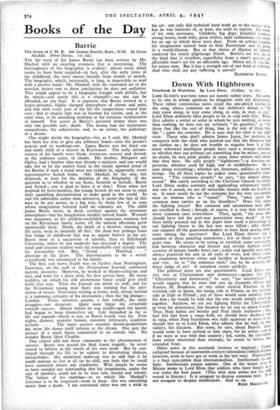Books of the Day
Barrie
The Story of J. M. B. Sir James Barrie, Bart., O.M. By Denis Mackail. (Peter Davies. its. 6d.) THE life story of Sir James Barrie has been written by Mr. Mackail with an exacting evenness that is interesting. The thoroughness of the biographer is evident : almost every detail seems to have been supplied—in fact, after the early years of the childhood, the story moves literally from month to month. The biography, which, necessarily, is long, is impossible to read with a passive mind Mr. Mackail, with the concealed art of the novelist, invites one to draw conclusions he does not authorise. This would appear to be a biography fraught with pitfalls, but by which—and surely this is a triumph?—no one can be offended, no one hurt. It is apparent that Barrie existed in a hyper-personal, highly charged atmosphere of charm and pain, and that with every year of his life the temperature round him lose ; that to inspire him was to become his victim, and, at the same time, to be unwilling assistant at his tortuous victimisation of himself. For actors in Barrie's personal drama there was only one possible exit: death. The drama had the mysterious compulsions, the subjectivity, and, to an extent, the pathology of a dream.
One might divide the biography—for, as I said, Mr. Mackail has been too wise to give any arbitrary frame—into the dream's genesis and its workings-out. James Barrie was the third son and ninth child of a weaver in Kirriemuir. The early circum- stances of his family were bleak, strenuous, austere and devoid, in the ordinary sense, of charm. His mother, Margaret nee Ogilvy, had a brother who was already a minister, and one would take her to be the motive force in the steady upward trend of the Buries if such a trend were not evident in, apparently, every representative Scotch home. (Mr. Mackail, by the way, has disposed, at least for the duration of the biography, of the question as to whether to say Scots, Scottish or Scotch: Barrie said Scotch ; one is glad to leave it at that.) Even when not inspired by hero-mothers, the young Scotch do not seem to relax their unsmiling determination to make good in the world. In real life admirable rather than attractive, it seems the fate of this race to be put across, in a big way, by those few of its sons whose imagination fostered itself on romantic art. The child James Barrie never, in deed, revolted against the strenuous atmosphere—but his imagination steadily moved South. Warmth was necessary, so his childish-unchildish rapacious emotion fed on the Kirriemuir family scene, till the natural affections grew unnaturally deep. Death, the death of a brother, entering his life early, went to intensify all this : the dead boy perhaps froze that image of childhood that was to appear forever in his art. Barrie went to a succession of schools, then to Edinburgh University, where he did modestly but obtained a degree. The small pale anxious student with the remarkable eyes already made
his personality felt. But, " Grind . . . Humbug . . ." alternate in his diary. The determination to be a writer crystallised, was announced to his family.
The first real move South was no further than Nottingham. Existence, on the staff of the Nottingham Journal, continued narrow, intensive. However, he worked at theatre-criticism and met, and went for a drive with, his first actress here. He wrote middles, on which his still anonymous fancy could give itself fairly free rein. Then the journal cut down its staff, and for the Kirriemuir young man there was nothing but the anti- climax of return. Free-lance writing at home, with, always behind it, a tautening certainty of his destination ; then the big plunge—
London. There, tentative pauses, a few rebuffs, the early struggles—not desperate. Quite soon began the crescendo towards success. Almost before he was middle-aged the laurels had begun to heap themselves up. Life Expanded as far as life can expand—which is not, as Barrie found, very far. First nights, dinners, majestic houses, romantic intimacies, academic acclaim . . . The more success assumes dream-proportions the more life shows itself inferior to the dream. One gets the picture of a small figure committed to an outsize fate. No wonder Barrie liked Chaplin.
One cannot add any more comments to the phenomenon of success. Barrie was spared the final ironic tragedy: he never ceased to believe in the worth of his own work. But he con- tinued through his life to be subject to devastating silences, melancholies. His emotional make-up was so odd that if he could manage to live at all (as he did), one feels that he could have sustained almost any conditions. With people he seems to have avoided any relationship that his imagination, under the rule of symbols, could not in its turn rule, mould and inform. The failure of his marriage—as to which Mr. Mackail's reticence is to be respected—went in deep: this was something worse than a death. I am convinced there was not a trick in his art : not only did technical hard work go to the output of it, but he was innocent of, at least, the wish to exploit. He wrote of his own nostrums. Children, big dogs, beautiful mothers, strong hearts, weak wills, great wishes, mild realisations—he wrote for an age to which these were dear. From an urbane London his imagination turned back to float Kirriemuir and its pious in a world-illusion. But to that shrine of illusion he himself rendered his yearly pilgrimage North. Barrie's art was an of the kind that is overflow, superfluity from a man's person ; an affectable man's art for an affectable age. Minor art, if you like, for minor men. But it has a strength out of one kind of suffering. And who shall say any suffering is unreal?
ELIZABETH BOWER.


























 Previous page
Previous page